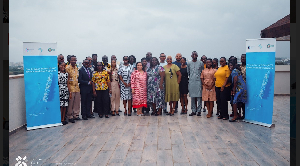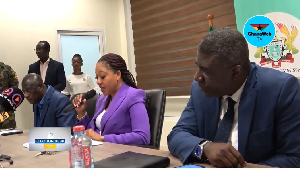Divine Kutortse, the program manager in charge of support and trade at the National AfCFTA coordination office, has emphasized the importance of value addition to fully utilize the opportunities presented by the Africa Continental Free Trade Agreement (AfCFTA).
Speaking to the media on the sidelines of a capacity-building exercise organized by the International Trade Centre and the African Export-Import Bank (Afreximbank) for some small and medium-sized enterprises in the cocoa and coffee industry in Ghana on Thursday, July 18, 2024, Divine Kutortse called for a paradigm shift in Ghana’s resource harnessing from the exportation of raw materials to value addition.
Divine Kutortse, who lamented the existing economic practice of exporting raw materials, noted that Ghana risks missing out on the numerous benefits of the AfCFTA if the country does not transition from raw material production to finished product exports.
Divine Kutortse said that his outfit is committed to providing knowledge and resources to Ghanaian businesses to empower them to grow beyond the borders of the country and dominate markets outside Ghana.
With 47 out of 54 countries ratifying the AfCFTA Agreement, there exists a huge market for Ghanaian SMEs in the cocoa and coffee industry. Businesses should undertake comprehensive research to discover the countries where their products are highly sought after and how they can navigate the funding and regulatory challenges to export to those countries.
“AfCFTA seeks to remove duties and non-tariff barriers, but if traders don’t know the industry and how to search for new markets, we may not be able to realize the full benefit of the AfCFTA.
“If AfCFTA should work properly, it should be the 8th largest economy in the world, which means there will be huge market opportunities for us. Our focus is on how we can look within, but that has been a challenge, and the strategy is how to work on it. We have Africans who consume coffee, and we produce the raw materials of coffee here, so let’s look within and put in place measures to ensure that what we are trading is of high standard and value.
“We are big suppliers of raw materials of coffee, so clearly we can make it work. One of the challenges for low intra-African trade is that despite our rich resources, we contribute less than 3% to global trade. One of the reasons for this is that we export mainly raw materials, and we need to change that. Our interest is in promoting value addition,” he said.
Larry Attipoe, National Coordinator for the International Trade Centre’s value chain work in Ghana, reaffirmed the commitment of his outfit to the expansion of Ghanaian businesses.
He stated that the ITC will continue to work with SMEs to expose them to best practices such as bookkeeping, business structure, and producing to meet global standards, among others.
“We want to support SMEs to overcome the challenges that confront them if they want to get into global value chains. We know that’s where the value is, so we want to remove all those barriers. The AfCFTA has created opportunities for companies who want to go beyond the boundaries of Ghana, but they need to know the rules and potential challenges, and the workshop aimed to expose them to that and give them practical tools to navigate.
“We also want them to learn the details and rules of specific countries. The workshop is to get them ready for when they want to cross the border and get their products to other countries. We are all united and committed to helping the SMEs cross boundaries and meet the demands on the continent.”
Wisdom Tawiah, who represented the African Export-Import Bank (Afreximbank), reiterated his outfit’s commitment to the promotion of intra-African trade.
He encouraged the participants to put into practice the lessons from the workshop and help position Ghanaian businesses as leaders in the cocoa and coffee marketing sector.
Some of the participants who spoke to the press expressed happiness with the workshop, which they described as informative and transformational.
They promised to put into action what they gleaned from the conference and take advantage of the AfCFTA to expand their businesses and operations.
Business News of Friday, 19 July 2024
Source: www.ghanaweb.com

















